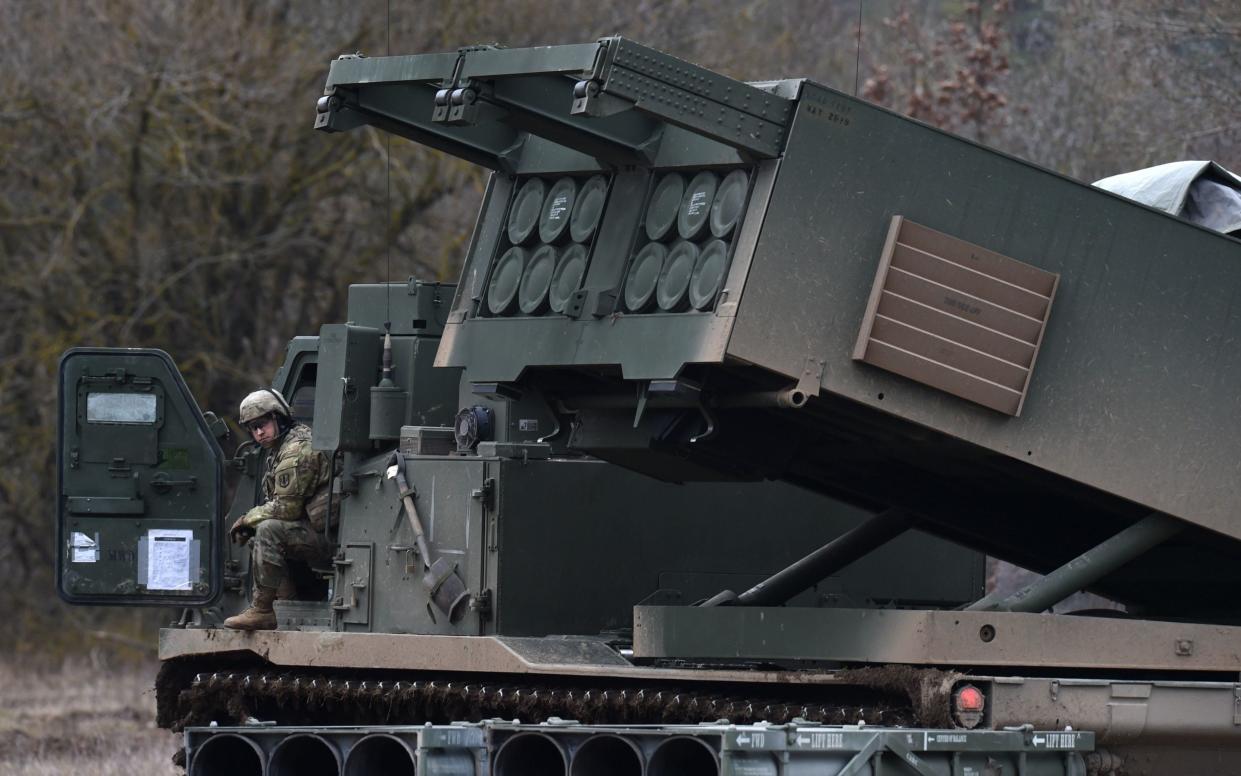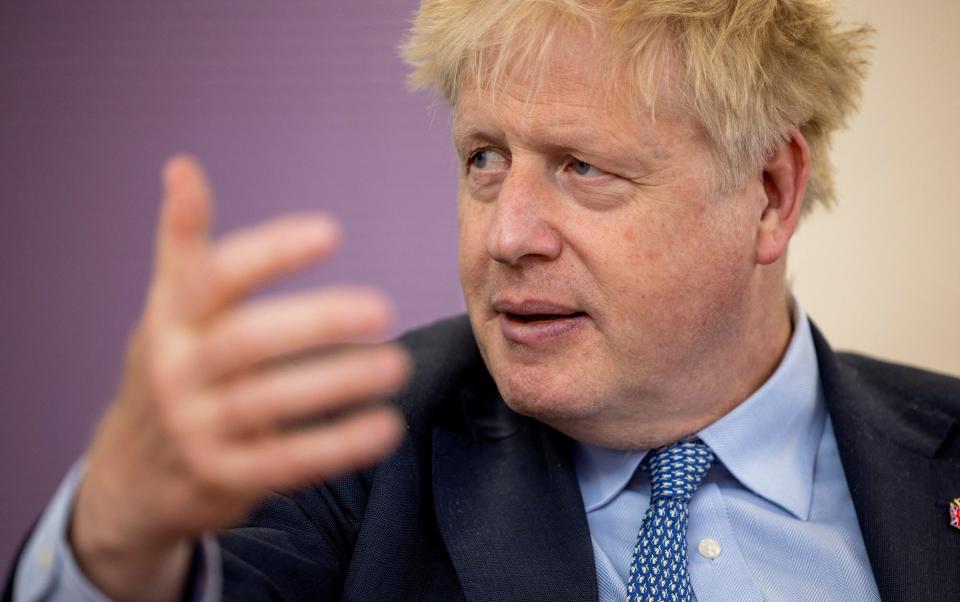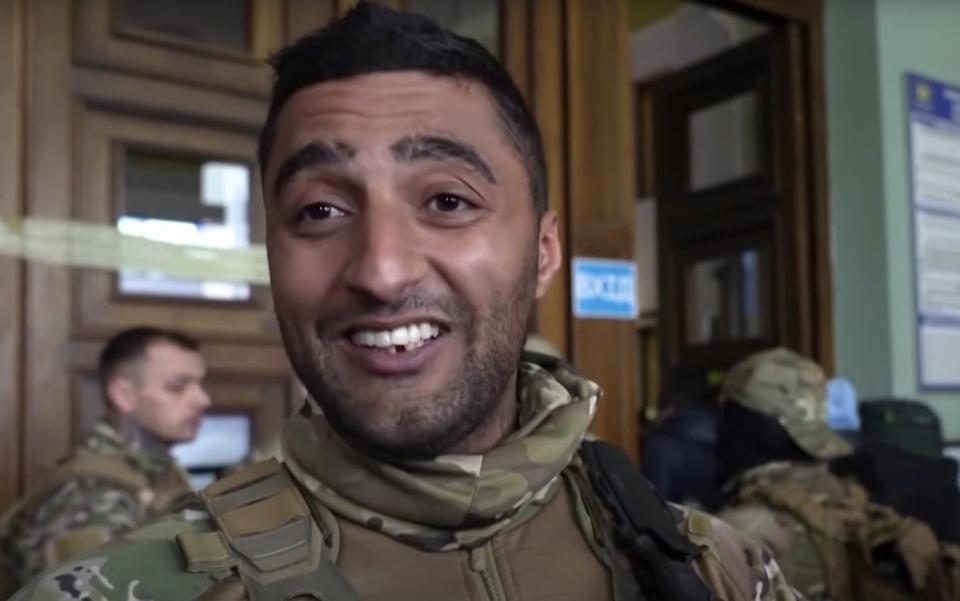Boris Johnson calls for ‘vital’ long-range weapons to be sent to Ukraine

Boris Johnson on Friday called for advanced long-range weapons to be sent to Ukraine as Russia makes “palpable progress” in the eastern Donbas region.
With Ukrainian resistance fighters in the area under mounting pressure from Russian forces, the Prime Minister said it was “absolutely vital” to give Kyiv the equipment to defend itself against the artillery bombardment.
His intervention came as the United States was preparing to send multi-launch rocket systems (MLRS) to Ukraine as part of a significant upgrade to its offerings of military aid.
Volodymyr Zelensky, Ukraine’s president, has repeatedly called on Western nations to deliver heavy weapons that would allow his troops to hit back at Russian targets hundreds of miles away.
Speaking to Bloomberg Television, Mr Johnson said the MLRS “would enable them to defend themselves against this very brutal Russian artillery”.
“That’s where the world needs to go,” the Prime Minister added.

Fighting in the Donbas, Ukraine’s industrial heartlands, intensified on Friday as Russian troops reached the outskirts of Severodonetsk, the last Ukrainian-held city in Luhansk.
Ukrainian fighters were said to be engaged in a “fierce defence” of the city, which was two-thirds surrounded by Russian troops.
In a separate battle, Ukrainian troops were forced to retreat from nearby Lyman, which was under Russian control.
In a call for further Western support for Kyiv, Mr Johnson said: “I'm afraid that Putin, at great cost to himself and to the Russian military, is continuing to chew through ground in Donbas.
“He’s continuing to make gradual, slow, but I’m afraid palpable, progress and therefore it is absolutely vital that we continue to support the Ukrainians militarily.”

In a post on the Telegram messaging app, local officials in Severodonetsk said the city was under constant bombardment by Russian shelling.
In scenes reminiscent of those in the war-ravaged port city of Mariupol, Alexander Stryuk, the mayor of Severodonetsk, said the long-range attacks had totally destroyed 60 per cent of housing in the city.
“In the last two days, firing on the city has not stopped,” he said. “The shelling by the Russians is very strong.”
Mr Stryuk added at least 1,500 people had been killed in the city and that between 12,000 to 13,000 were still living there.
Russia has poured considerable resources into its attempt to capture Severodonetsk, which would hand Moscow complete control over Luhansk, one half of the eastern Donbas region.
Moscow redirected its efforts to Ukraine’s coal-producing region after failing to capture Kyiv.
Using artillery bombardment to provide cover, the Kremlin’s forces were able to secure a position on the outskirts of the city.
Sergiy Haiday, the regional governor of Luhansk, said Russian troops had seized a hotel complex in the area, but Ukrainian forces were fighting to win it back.
“The situation remains difficult because the Russian army has thrown all its forces at taking the Luhansk region,” he said.
“Extremely fierce fighting is taking place on the outskirts of Severodonetsk. They are simply destroying the city, they are shelling it every day, shelling without pause.”
Heavy artillery has become the constant backdrop to the conflict in the Donbas, with Russians launching shells over vast distances at Ukrainian targets to prevent counter-attacks.
In his nightly address, Mr Zelensky said Moscow’s assault could leave the entire region “uninhabited”.
“All this, including the deportation of our people and the mass killings of civilians, is an obvious policy of genocide pursued by Russia,” he said.
“The current offensive of the occupiers in Donbas can make the region uninhabited. They want to burn Popasna, Bakhmut, Lyman, Lysychansk and Severodonetsk to ashes. Like Volnovakha, like Mariupol.”
Since the start of Vladimir Putin’s invasion of Ukraine on February 24, there have been 8,691 civilian casualties, with 3,998 people killed, according to the United Nations.
Military analysts argue that Ukrainian troops would be able to shift the conflict back in their favour with Western-donated precision missile systems.
As it stands, Ukraine is unable to match Russian artillery efforts.
The US was planning to send Kyiv long-range MLRS as part of a new military aid package, officials told CNN.
The UK is also pondering over whether to send the systems to Kyiv, the officials added, but would only do so on Washington’s lead.
Moscow’s state-controlled television news channel said the US would be “crossing the line” if Ukraine is given these weapons.
The systems can be capable of hitting targets 310 miles away, according to military analysts Rochan Consulting.
“At the same time, Ukraine requires significant numbers of these systems to change the situation on the battlefield, along with continued access to rockets and spare parts,” the firm added, in its daily conflict report.
According to Ukrainian intelligence, Russian forces have used more than 60 per cent of their high-precision weapon stockpiles, leading to increased indiscriminate attacks.
In its daily intelligence briefing, the Ministry of Defence said Russia had been forced to deploy 50-year-old tanks in southern Ukraine.
“Russia’s Southern Grouping of Forces (SGF) likely remains tasked with occupying southern Ukrainian territory. In recent days, Russia has likely moved 50-year-old T-62 tanks from deep storage into the SGF’s area of responsibility,” the MoD said.
“The T-62s will almost certainly be particularly vulnerable to anti-tank weapons and their presence on the battlefield highlights Russia's shortage of modern, combat-ready equipment.”
The impact of Western sanctions is believed to have starved Moscow of its ability to replace tanks lost on the battlefield, which Ukraine estimates to be more than 1,300.
Ben Grant, the son of a British Conservative MP, was filmed as part of an international volunteer unit that destroyed a Russian armoured vehicle as part of a 15-hour operation that killed 30 Russian troops.

In a sign Western sanctions were impacting the Russian economy, truckmaker Kamaz on Friday announced it was putting more than 5,000 staff on reduced hours, blaming a parts shortage.

 Yahoo News
Yahoo News 
